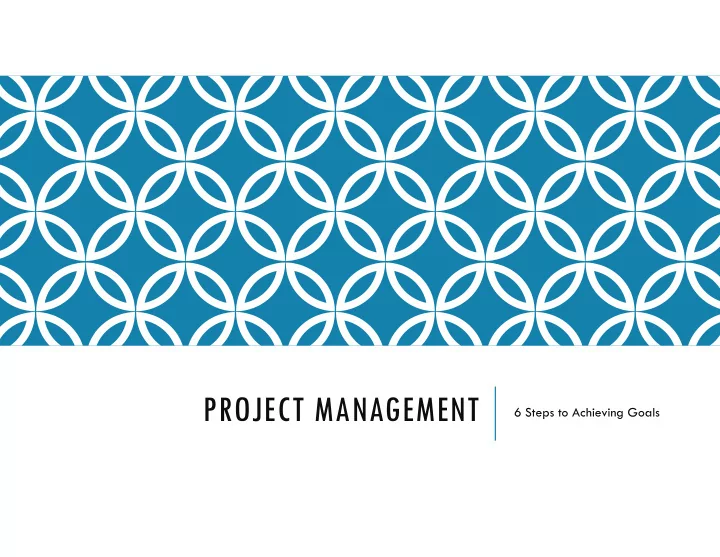

PROJECT MANAGEMENT 6 Steps to Achieving Goals
P roper P lanning P revents P oor P erformance
STEP 1: TEAM • Meet with Project Sponsors & Key Stakeholders • Ask & Answer: • What are needs & expectations? • Project Scope (In & Out) • Budget • Timeline • Document in Project Management Template • Send recap to Sponsors & Stakeholders • Identify Project Team Members • Do you have any skills missing from team? • Utilize Stakeholders & Sponsors to gain missing team members
STEP 2: SET & PRIORITIZE GOALS • Prioritize the needs & expectations of project • “BUT EVERYTHING IS IMPORTANT” – Having trouble prioritizing? Start Ranking goals by urgency & importance • Set specific project objectives • Project objectives must be measurable and contain key performance indicators that will be used to assess a project’s success. • These indicators will often encompass areas such as budget, quality, and time to completion
Excellent point to check-in with Consumers of project output! - Avoid non-value added activities by pulsing with your Consumers!! - Does this deliver value?
STEP 3: DEFINE DELIVERABLES • Identify the deliverables & project steps to deliver goals • What are the specific outcomes you expect to produce? • Estimate due dates for each deliverables • Set firm milestones for essential deadlines and deliverables. • Track your progress once work begins to ensure you complete tasks on time and keep stakeholders happy.
STEP 4: CREATE PROJECT SCHEDULE • For each deliverable, define series of tasks must be completed to accomplish each one • Define the amount of time for each task • Include resources required • Owner of task • Identify Dependencies • Do you need to complete certain tasks before others can begin? • Input deliverables, dependencies, and milestones • “I can count on you!” • Involve team into the planning process. • The people performing the work have important insights into how tasks get done, how long they'll take, and who's the best person to tackle them. • Draw on their knowledge! You'll need them to agree with the project schedule and set expectations for work to run smoothly • Staying Connected • Determine where project plan will be housed for team (including key documents) • Determine Team Rules
STEP 5: IDENTIFY RISKS • No Project is Risk FREE • Any issues you know of upfront that will affect the project planning • Team Vacations, Holidays, Material Delays, Busy Seasons • Prevent Risk or Limit Impact • Review project plan and add steps to limit risks impact • TIP: Tackle high risk items EARLY • TIP: Add “Buffer” Time to help keep project on track
STEP 6: COMMUNICATION STRATEGY • Share Project Plan with Stakeholders • Explain how your plan addresses stakeholders' expectations, and present your solutions to any conflicts. • Make sure your presentation isn't one-sided. • Have an open discussion with stakeholders instead • Be clear on what you expect of stakeholders (actions needed) • Determine Roles • Who needs to see which reports, and how often? • Which decisions will need to be approved, and by whom? • Project Plan
RETROSPECTIVE Post – Project: Understand what can be improved Celebrate SUCCESSES
KEYS TO SUCCESSFUL PROJECT MANAGEMENT 1. SCOPE : Stakeholders must agree on definition of success (i.e. Final Outcome) a. MOST IMPORTANT: Identify what is NOT included within project scope 2. PLANNING = 80 - 90% of Project Management a. P roper P lanning P revents P oor P roject P erformance 3. SKILLS REQUIRED : Consider skill-set needed for team members 4. COMMUNICATION : How will you communicate with your team? 5. RISKS : Understand risks & discuss with team on how to manage challenges 6. RETROSPECTIVE : After completing – always discuss what worked & what didn’t so you can continue to improve
Recommend
More recommend